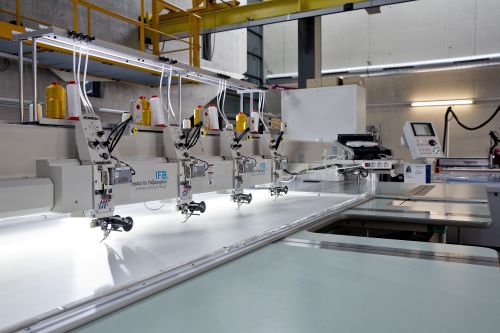New joint project at the Institute for Aircraft Construction

TFP machine for the resource-efficient depositing of carbon fibres (black coils) at the Institute for Aircraft Construction at the University of Stuttgart. (photo: University of Stuttgart/Regenscheit)
Together with three companies the Institute for Aircraft Construction (IFB) at the University of Stuttgart researched the automated conversion of components for aeronautical applications with a high lightweight potential, such as for example structures of aircraft seats or reinforcements of window frames.
The efficiency of the automation process as well as the quality and functionality of the products resulting from this is to be increased through a number of further developments. The objective of the project going by the name of “3D TFP“ is the material-efficient manufacturing of the products as well as a sustainable reduction in CO2 emissions in flight operations.
In order to achieve this, the partners use a manufacturing process with which the expensive carbon fibres can be arranged almost without offcuts and with a good load-bearing capacity in the component (Tailored Fibre Placement, in brief TFP process). Since an effective and to date quick deposit of the fibres has only been possible on the flat side, a reliable method to convert these semi-finished products is to be developed into a complex 3D structure.
The focus thereby is an automated and resource-efficient production of aeronautical components that on the one hand reduces the process tolerances and on the other hand the overall process costs. With this the door to production would be opened in a high-wage country like Germany. Furthermore, the scientists wish to integrate additional functions such as, for example conductive or sensory elements in the component. These added values are to justify the higher manufacturing costs compared to the classic metal construction and increase the market opportunities of the end product.
Alongside the IFB at the University of Stuttgart as the main developer, the consortium comprises the manufacturer of aircraft seats RECARO Aircraft Seating in Schwäbisch Hall, the synthetic resin manufacturer Sika Deutschland in Bad Urach and the process automation supplier Siemens from Stuttgart. Within three years the partners jointly intend to press ahead with the automated manufacturing of low cut-off waste semi-finished products to manufacture lightweight parts from fibre plastic composites. The project is being funded with a sum of 321,000.- Euros by the State of Baden-Württemberg in the framework of the strategy for the lightweight construction.
Further information:
Prof. Peter Middendorf, University of Stuttgart, Institute for Light Aircraft, Tel.: 0711/ 685-62411, email: peter.middendorf (at) ifb.uni-stuttgart.de
Andrea Mayer-Grenu, University of Stuttgart, Department of University Communication, Tel. 0711/685-82176, email: andrea.mayer-grenu (at) hkom.uni-stuttgart.de
Media Contact
More Information:
http://www.uni-stuttgart.de/All latest news from the category: Materials Sciences
Materials management deals with the research, development, manufacturing and processing of raw and industrial materials. Key aspects here are biological and medical issues, which play an increasingly important role in this field.
innovations-report offers in-depth articles related to the development and application of materials and the structure and properties of new materials.
Newest articles

Silicon Carbide Innovation Alliance to drive industrial-scale semiconductor work
Known for its ability to withstand extreme environments and high voltages, silicon carbide (SiC) is a semiconducting material made up of silicon and carbon atoms arranged into crystals that is…

New SPECT/CT technique shows impressive biomarker identification
…offers increased access for prostate cancer patients. A novel SPECT/CT acquisition method can accurately detect radiopharmaceutical biodistribution in a convenient manner for prostate cancer patients, opening the door for more…

How 3D printers can give robots a soft touch
Soft skin coverings and touch sensors have emerged as a promising feature for robots that are both safer and more intuitive for human interaction, but they are expensive and difficult…





















